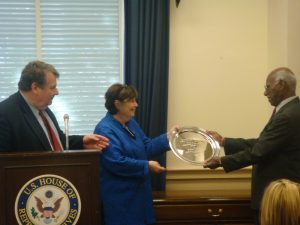 The William E. Bennett Award for Extraordinary Contributions to Citizen Science was established by the National Center for Science and Civic Engagement and named in honor of its first recipient for his lifetime contributions to citizen science. The first award was presented to its namesake at a ceremony on Capitol Hill on March 31, 2009.
The William E. Bennett Award for Extraordinary Contributions to Citizen Science was established by the National Center for Science and Civic Engagement and named in honor of its first recipient for his lifetime contributions to citizen science. The first award was presented to its namesake at a ceremony on Capitol Hill on March 31, 2009.
About William E. Bennett: Hailing from Chester, Pennsylvania, Bennett graduated from Lincoln University, holds a doctorate from the University of Pennsylvania, and was a postdoctoral fellow at Rockefeller University.
Prior to retirement, Bill served as senior science advisor to the Secretary, U.S. Department of Health and Human Services. During a long and distinguished career, Bennett held appointments as medical school faculty, bench scientist and scientist administrator in the U.S. Department of Defense and U.S. Department of Health and Human Services. Bill has published, lectured and consulted in the areas of cellular immunology, cell differentiation, medical education, and disease prevention. He chaired the Education and Credentials Committee of the US Congressional Black Caucus Taskforce on the US/Cuban Medical Scholarship Initiative, co-chaired its site visit to Cuba and authored the taskforce’s report on Cuban Medical Education. A long time advisor to the NSF-sponsored SENCER (Science Education for New Civic Engagements and Responsibilities) project, Bill has served as one of the founding senior scholars with the National Center for Science & Civic Engagement. Currently, he sits on boards for Lincoln University and both CDC and NIH funded projects. He has been honored by numerous national and international organizations, medical colleges, and federal agencies. Bill also holds two honorary doctorates.
NCSCE’s “William E. Bennett Award” (immediately dubbed “the Webby” by old SENCER hands at the award ceremony), is the second award named after Bill. In 2000, he was the first recipient of the award named in his honor, The Annual William E. Bennett Award, at the Morehouse School of Medicine-an institution he helped to establish. Bill also holds two honorary doctorates.
The William E. Bennett Award will be awarded annually to a person, team or institution whose SENCER and other related activities have made exemplary and extraordinary contributions to citizen science. Details on the nomination and selection process will be announced at the SENCER Summer Institute in August and communicated to the broader NCSCE and SENCER communities following that formal announcement. It is our plan to make the 2010 award at a ceremony on Capitol Hill next spring.
